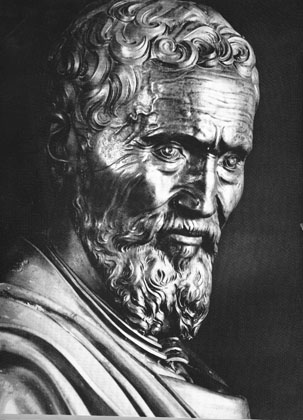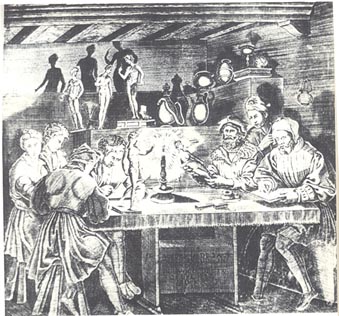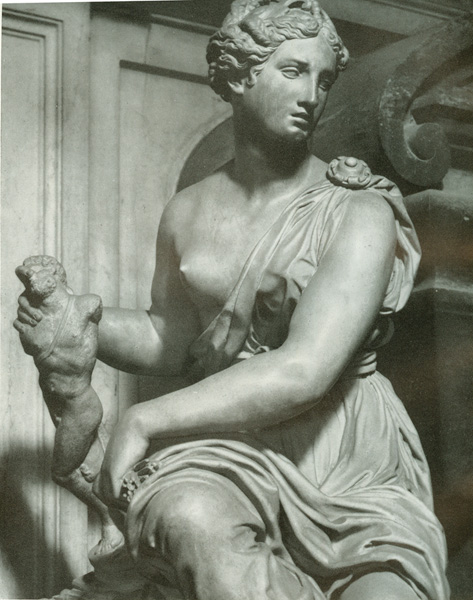|

Michelangelo (1475-1564)
by Daniel da Volterra (1565)

| Engraving showing sculpture students studying small clay models at the Academy of Baccio Bandinelli in Rome, in Michelangelo's time By Agostino Veneziano, 1531, London, British Museum. |

Model on Michelangelo's tomb
History of the Models
|
"Bozzetto is a Italian word, meaning the bud of a flower,
a rose bud not fully blown; in art it means a model for
a sculpture or a sketch for a painting. In Michelangelo's
own words it means, 'the first birth from which a work of
art springs.' Disegno, means almost the same, - a drawing
or model, aan idea in its first shape. Therefore, we must
consider Michelangelo's models together with his drawings"
---Ludwig Goldscheider (1962)
Michelangelo made small clay models from which he carved his statues. The "David" 18 feet high is said to have been carved from a model 12 inches high. Most of the models have been lost to time. A old story is said that a student once brought ro Michelangelo a clay model he made for his review. In a few minutes, Michelangelo, reworked the entire piece. He then admonished his student to "practice, practice, practice". A sidenote, Michelangelo, was plagued with bad students I recall once looking at drawing b y one of his students. Michelangelo had made corrections all over it! In one of the letters to his father, he asked him to stop sending him students that had no skill. Can you imagine being one of the best artists of his time and having students like this? Michelangelo, must have been tearing out his hair!. It is reported that two large boxes of models were given to Michelangelo's favorite pupil, Antonio Mini, who took them to France. Mini also took a largr number of Michelangelo drawings and his Michelangelo's Painting Leda and the Swan. Mini died in Paris, France shortly after arriving there. Florintine Sculptor Giovanni Rustici, happened to be in Paris at the time, and returned some of the models, probably the 40, to Florence Italy. As a student Rustici would have recognized the work of his teacher Michelangelo. Tintoretto ended up with the models who made sketches of them and used them in the background of some of his paintings. Vasari got the models next. When Vasari died his heirs sold his Michelangelo artifacts to the rich "silk king" Paul Von Pruan in Bologna, Italy. Praun was collecting artifacts of famous artists of the time. He was the best art collector of all times. His collection inclded thosands of paintings, drawings, scuptures, prints, engravings by the the famouse artists of the day and past. His collection, later became the basis for all the national art museums in Europe, Although, the collection was never to be sold, it was sold in 1803. to the royalty of Europe. Later, when the European Kingdoms became republics, the King's private art collections became public art museums. For example, the Louvre was once the home of the French King it is now a museum.
Michelangelo is also recorded to have given models to
admirers
some of which Van Praun bought up later.
Michelangelo is also recorded as destroying his work prior
to his death, so that know one will know his secrets. Those that
remained ended up smashed against the wall of his studio.
There were 40 models in the orignial Von Praun
Collection. The von Praun Collection ramained
intact till 1803 when the were sold.
The 40 models in the Von Praun Collectin
remained were alsways sold to one buyer.
After 1803 seven of the models were sold to
single buyers. The remaining 33 models were then sold
as a single unit till the 1938 Christies sale when it
was sold to 7 different collectors.
In 1938, thirty three of the models
were sold at auction in 1938 at Christies
to 7 different buyers. Eleven of the models in the Christe's
sale have since been lost. These models may have been destroyed
or are sitting in bank deposit boxes somewhere...
|
|
|